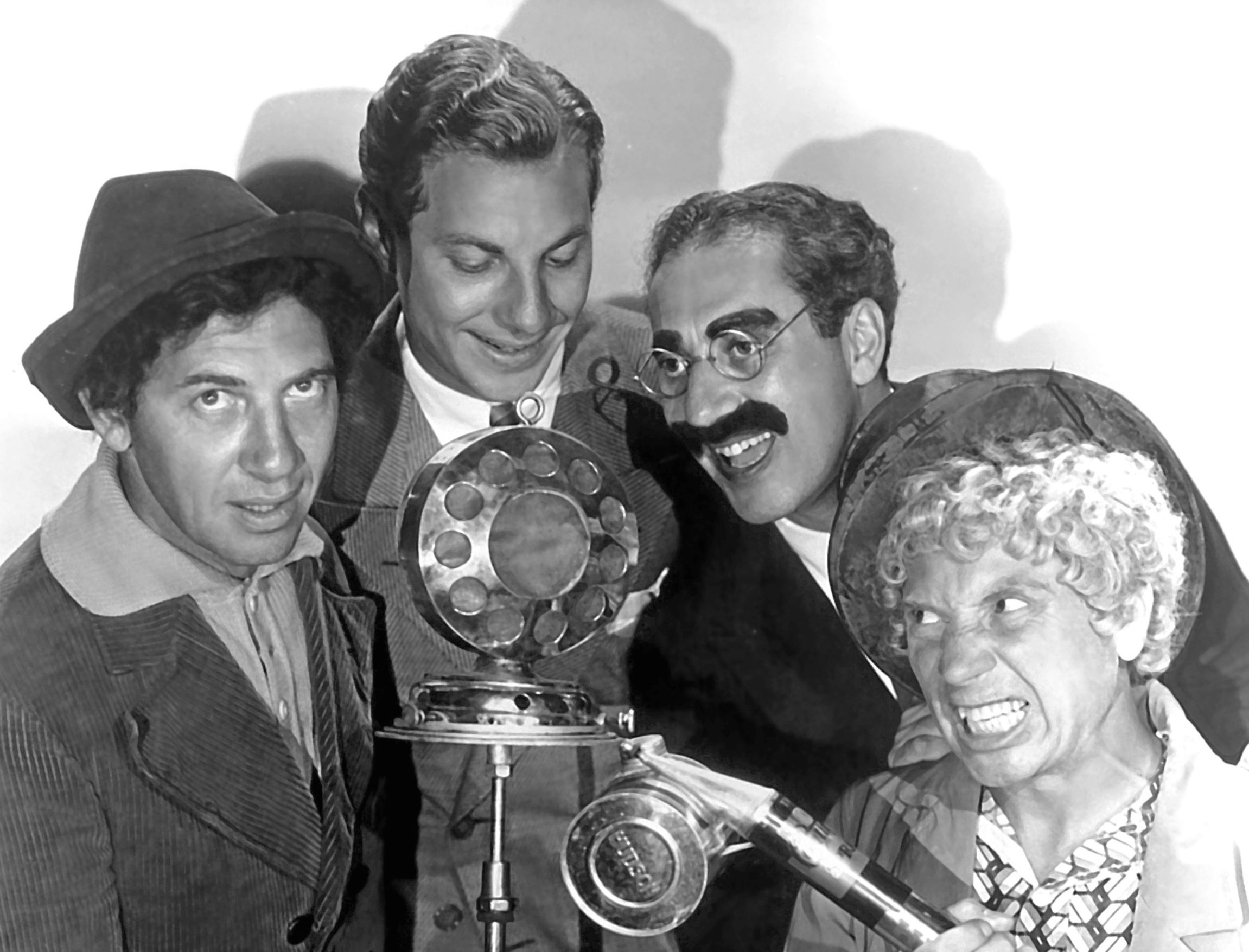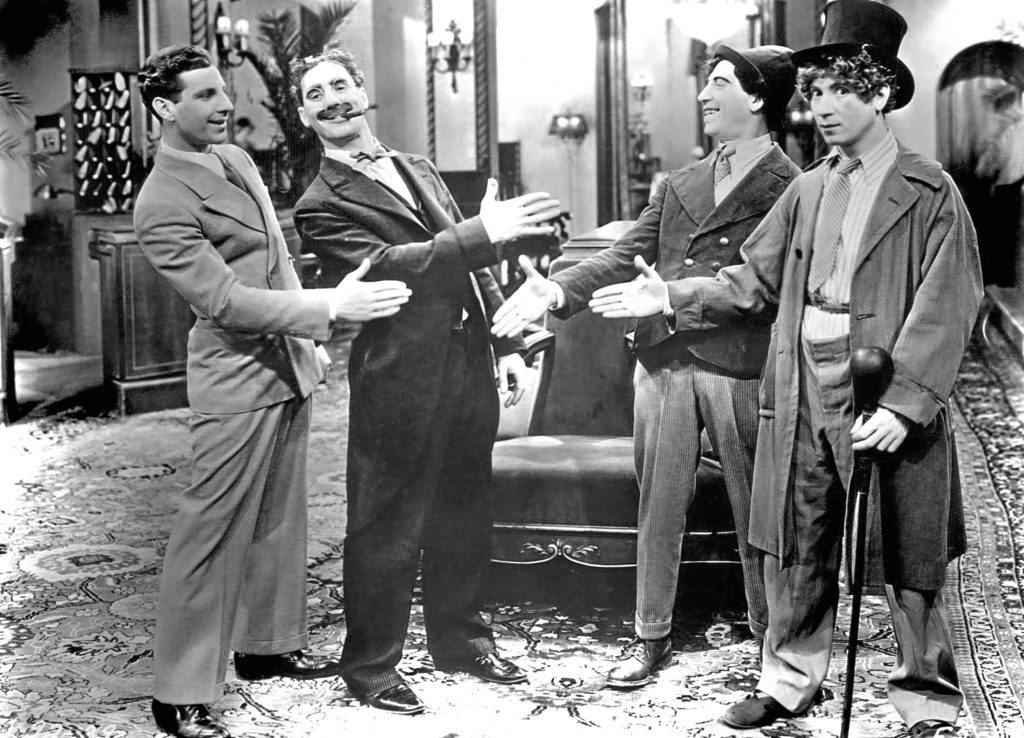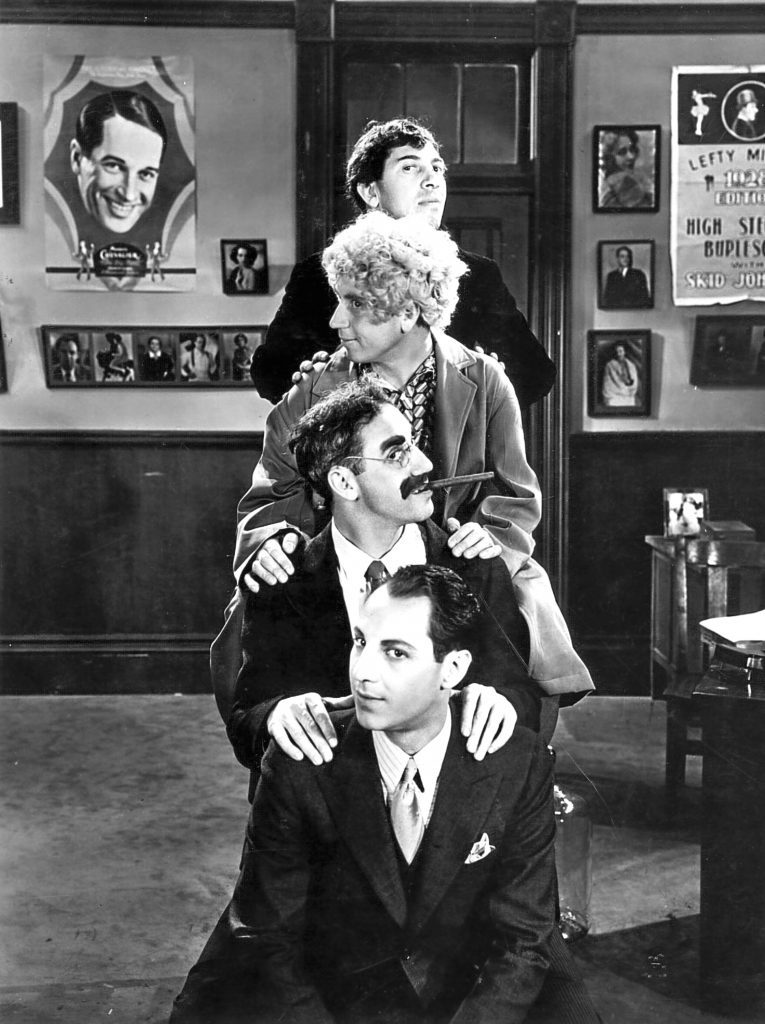
THEY say the customer is always right, but the Marx Brothers first tasted success after making fools of their audience.
As a vaudeville act in 1912, they were performing at a venue in Texas and getting little response from the crowd, when they were interrupted by a commotion outside.
It was a runaway mule causing mayhem, and the whole audience rushed outside to witness it, clearly more interested in a mad ass than the Marx chaps on stage.
When they eventually filed back in, Groucho Marx was furious and began making fun of them, talking about “The jackass of Tex-ass” and coming up with various insults.
Instead of being angry, the audience howled with laughter, and the Marx boys suddenly realised that they could make people laugh.
It would still take a few more years for them to hone their act, and eventually turn their riotous humour into movies, but more than a century later, the Marx Brothers are still widely considered the funniest film brothers of all time.
Most fans would agree on a handful of Marx Brothers movies that are the best.
Animal Crackers, Duck Soup, Monkey Business, A Night At The Opera and A Day At The Races are the usual favourites, in no particular order.
All were made between 1930 and 1937, and all but the last couple were made with four Marxes involved.
That quartet was Groucho, Harpo, Chico and Zeppo, and after Zeppo left, the remaining three continued to turn out comedy classics.
Born in New York between 1891 and 1901, the sons of Jewish immigrants from Germany and France, there was also a fifth brother, Milton, better known by his stage name Gummo.
He quit acting after being called up during the First World War, and when he got back to Civvy Street, he became a theatrical agent instead.
They say he got his nickname because he liked to creep up on people, like a gumshoe, or detective.
Despite not being part of the famous four, Gummo remained close to them.
The best-known of the brothers was Groucho — and surely nobody has been so far ahead of his time as Groucho Marx was, and much of his humour is as sharp and outrageous today as it was a hundred years ago.
The Cocoanuts, released in 1929, was their first proper movie, and the ideal way to introduce their crazy antics to the world.
They had made one before, though it was never released and is thought to have been lost forever — when they saw the first rushes of The Cocoanuts, they wanted to lose it, too.
Groucho and his brothers were horrified, thought it was awful, and even offered to pay for the negative and destroy it.
Their film bosses thought differently, however, put it out and then had a massive hit!
As critics of the day said, it might have had great tunes by Irving Berlin, and was the first sound movie to have two directors, and also featured the wonderful Margaret Dumont, who would be the butt of many a Groucho joke in the future.
But they all reckoned its success was down to how hilarious Groucho, Harpo and Chico were.
Not so much Zeppo, of course. He always kept a straight face and seemed to be there just to have his brothers ridicule him.
Little wonder he would eventually go off to do other things, just like Gummo.
Groucho played Mr Hammer, boss of the Hotel de Cocoanut, a resort hotel looking to make lots of money from visitors during the 1920s land boom in Florida.
Chico and Harpo arrive with empty luggage, planning to con and rob anyone gullible enough to listen to them.
That pair would often play conmen, and it’s fair to say that, along with Groucho’s puns, one-liners and biting sarcasm, Harpo and Chico’s many talents carried most of their movies.
Seeing Harpo for the first time today is a weird experience for new, younger fans, and the mind boggles at how they took to him back then.
He had worn a red wig, but it looked black on the black-and-white screen, so from the film Animal Crackers on, he sported the curly blond one we know and love.
Chico’s jet-black mane was to go with his Italian accent, although he often covered it with a bizarre Tyrolean hat and it was almost never stated in a film that he actually was Italian.
While Chico would often steal some of the most-iconic scenes with his piano-playing — often hitting the keys with a curled thumb and straight index finger, a bit like firing a pistol — Harpo excelled on the instrument that gave him his nickname.
It’s been said that Harpo could only play a few tunes very well, while Chico could play countless tunes not so well, but the songs they came up with for the movies were always hilarious.
Harpo would even record an album of harp tunes.
One thing he was never likely to do was sing along — he never uttered a word, making millions of fans believe he really was mute, but it was all part of the act.
One myth that did the rounds for many years was that when he had spoken on stage, there had been a dreadful fire and he vowed never to talk again.
Groucho, however, mentioned in his memoirs that Harpo simply couldn’t memorise lots of dialogue, making him ideal as “The dunce who couldn’t speak”.
He would use a car horn and various other tricks to grab attention instead, and having a silent Marx Brother somehow added to the madness and mayhem.
Harpo usually had a collection of items inside his raincoat, sometimes a pair of scissors with which he would cut the tails of gentlemen’s coats or the smoking end of Groucho’s trademark cigars.
Chico got his nickname, apparently, after chickens.
According to Groucho, Chico had been a chicken chaser, a term for a womaniser.
“In England now, they call them birds!” he explained.
This was why they dubbed him Chicko, but a studio typesetter mistakenly left the “K” off, and they decided just to keep it that way.
While his brothers had all sorts of interests, Chico loved gambling, and lots of it. In fact, when the notorious gangster Bugsy Segal was murdered, he had a cheque from Chico in his pocket, for gambling losses.
“It was probably a good thing he didn’t cash it!” Chico laughed.
If The Cocoanuts had been a good start, the following year’s Animal Crackers was the perfect follow-up.
It remains notable for the Groucho song Hello I Must Be Going.
Phil Collins used the title for an album.
Many Groucho jokes from the movie have been used again and again.
For instance: “One morning I shot an elephant in my pyjamas. How he got in my pyjamas, I don’t know.”
Or: “Ever since I met you, I’ve swept you off my feet.”
Animal Crackers also gave the world a unique extra Marx Brothers snippet — in the 90s, more than 60 years after its release, a clip in Multicolor was found.
Part of a rehearsal for an Animal Crackers scene, it even showed Harpo without his normal costume and wig. It is the oldest-known colour footage of the brothers.
Groucho played Captain Jeffrey T Spaulding, famous explorer just back from Africa.
A well-known and well-off female socialite is hosting a special party for him, and an art collector is also going to be there, to reveal a very special painting.
Invited to talk about his African adventures, Spaulding starts such a ridiculous tale that he is interrupted, before someone realises the special painting has been pinched and replaced with a copy.
With the police surrounding the house and trying to locate the real painting, much silliness occurs before Harpo — bizarrely playing a professor — sprays a canned substance that knocks everyone out.
He ensures, before knocking himself out, too, that he collapses close to the glamorous blonde he has been harassing throughout the movie.
By the way, if you know anyone who discovers the Marx Brothers for the first time and wants to go straight out and buy every movie — it happens a lot — read on.
Between Animal Crackers and their next huge hit, Monkey Business, the Marx Brothers appeared for a few minutes in a little-known film called The House That Shadows Built.
A compilation from Paramount Pictures, made to celebrate their 20th anniversary, the brothers did a short scene to promote the upcoming Monkey Business.
Groucho himself claimed that this was one of the funniest pieces of work they ever did, and many fans and critics agree.
So tell that new Marx Brothers fanatic that he or she must try to track it down, if they really want the complete set!
Next week, we look at Monkey Business and the series of classic comedy films the Marx Brothers would produce from 1931 right through to the 50s.

Enjoy the convenience of having The Sunday Post delivered as a digital ePaper straight to your smartphone, tablet or computer.
Subscribe for only £5.49 a month and enjoy all the benefits of the printed paper as a digital replica.
Subscribe
